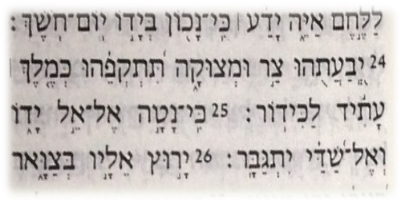I think an idiom (in English) is generated and understood by an English speaker in much the same way as any other foreign word or expression, e.g. "bon appetite", "deja vu", or "e pluribus unum". The difference is... when we say or write an obviously foreign expression, we know it is "foreign" and we expect the hearer/reader to recognize it as such and understand it.
An idiom is a word or (usually) a phrase from an ancestral or foreign language that has become (re)spelled as common words of the target language. This "definition" is in complete agreement with the etymology of the word "idiom"... from Greek for: something that you (borrow and) make your own.
There are several classes of idioms:
Class 1 - "clear text" foreign words/phrases that have been transliterated directly into common target-language words. Often the motivation for the original transliteration was to make a pun.
Examples using the [ancient sound] of some letters:
Hebrew maBooL GeSHeM SHQi'a = torrent rain descends, was maBooL Ge[T]eM [T]Qi[G]a ==> PoLe CaT aNd DoCGa ==> (raining) cats and dogs [Docga was OE for a 4-legged dog.]
Aramaic KiSHoT BaGaD = truth + betray, or betray by revealing the truth, was Ki[T]oT BaGaD ==> (let the) CaT ouT (of the) BaG
The same KiSHoT = truth occurs in the expression "Has the cat got your tongue?", that is, is the truth stuck on your tongue ... usually said to a child who doesn't want to lie but also doesn't want to utter the truth.
The same BaGaD = betray occurs in the expression "...left holding the bag". You have been betrayed by your friends/associates. They got away, but you are left holding the bag.
When you use these idioms, you do not feel like you are using a foreign word/phrase and the words used may indeed call to mind their ordinary referrents. "It's raining cats and dogs. Be careful. Don't step on that poodle." But the meaning you convey remains the meaning of the original foreign/ancestral term.
Other examples using common animals include "Welsh rabbit" (merely a list of its ingredients in Arabic: milk or cheese + ale on toast) and "White rabbit", the very first thing one must say at the beginning of the month to ensure a "month bountiful". Both of these involve a het-W parallel.
HhaLaV = milk + SHaKHaR = ale + PaT (lexem) = piece of bread, toast... was [W]aLav + SHakhaR + PaT ==> WeLSH RaBBiT
HhoDeSH = month + RaBaH = increase, be bountiful, was [W]oDe[T] + RaBa[DH] ==> WhiTe RaBBiT
The "beans" in "spill the beans" and "he doesn't know beans about ..." is related to BiNaH = understanding; wisdom, intellect. "Spill" is related to SaPeR = to tell, as in a long (Yiddish) shpeil."
The "music" in "face the music" is < Yiddish maskone = inference, consequence < Hebrew MaSKaNaH = conclusion, inference, deduction.
Pillar of Salt (in the story of Lot's wife) is a translation of Hebrew NaTZiV MeLaX, a Hebrew euphemistic idiom meaning a "stroke, thrombosis". That Lot's wife looked backwards is a hint that we should look backwards at this phrase. MeLaX is a reversal of XaLaM = to be strong, healthy. It is also a homonym meaning "dream". Compare dream's near homonyms "trauma, throm-, dorm(ant)". naTZiV is a reversal of BoTZ = mud. She became paralyzed and couldn't move (stuck in the mud, mud in her veins)... hence, Greek throm-bos(is). All of this has nothing to do with salt (NaCl) but is related to not having "salut" = health.
Class 2 - Transliteration of an ancestral/foreign metaphor (coded meaning).
I'm gonna beat the "livin' daylights" outta ya < liver and lights, where "liver" is the most dense body part and "lights" was the OE word for lungs, the least dense body part. The meaning was figurative. The speaker did not intend to literally extract the liver and lungs.
"kick (the) bucket" < proto-Semitic KaGav B'KayDen => Hebrew AaGav B'a:DeN = to make (physical) love in Paradise. This is still a middle-East metaphor for dying. On a less erotic note, we say "He went to his eternal reward." Both expressions are a euphemism for dying, a way to avoid saying "He died."
Class 3 - Translations into the target language of foreign-1 puns that had been transliterated into foreign-1 from "clear text" foreign-1 or foreign-2 words/phrases.
The classic example is Job 19:20 (to escape) "by the skin of my teeth" meaning "hardly, barely, with difficulty". In Hebrew, Job said B'oR SHiNai = skin of my teeth. But Job was making a euphemistic pun on the Hebrew word B'KoSHi = barely, with difficulty... at a time when the Hebrew aiyin had a velar G/K sound, as in 3aZa = Gaza."
I have found several Latin => Hebrew pun => English translation (of the Hebrew) examples:
Latin sopor sond = sleep soundly ==> Hebrew (li)SPoR tZoN = count sheep (to go to sleep)
Latin Saccharomyces cervisae = Brewer's yeast ==> Hebrew Sa'aR MiNSHaKH KeLeV = hair bite dog, i.e., "hair of the dog that bit you" = a hangover remedy. Cf the Greek 3-headed dog CeRBerus.
Class 1 + Class 3 is a (sometimes redundant) combination of these classes.
Example 1: "Break a leg" = said to an actor to wish him/her good luck. The normal term in Hebrew or Yiddish would beBRaKHa/BRaKHos = blessing/s. The pun is the Hebrew term for a knee or leg: BeReKH ... both of which sound like the English word "break". The translation of the euphemism/pun is "leg", hence "break a leg".
Example 2: (cold enough to) "freeze the balls off a brass monkey". It means, cold enough to make you shiver. This phrase probably entered English from Arabic, most dialects of which convert a P-sound to B."
Hebrew PeLeTZ = shiver, tremble. Compare English palsy.
Hebrew P'LiZ = brass P to B => BaLLS
Hebrew K'Foo = frozen
Hebrew KoF = monkey
Drop the K => oFF
So, "balls off" is a transliteration, while "brass monkey" is a translation, of the Semitic pun PeLeZ KoF = brass monkey on the plain text PeLeTZ K'Foo which means "shiver frozen".
In order to machine-translate idioms without table look-ups, one needs to determine the original source-language and sometimes to determine an intermediate language from which a translation was made.
As for human usage, I think all of this is irrelevant. If "e pluribus unum" = "out of many, one" had become an English idiom, it might have been spelled "a flower-bush you name", but it would still mean "out of many, one". And it would have been used just like the foreign phrase is used.

Like what you’re discovering? Continue the journey from Bible reader to translator.
|







